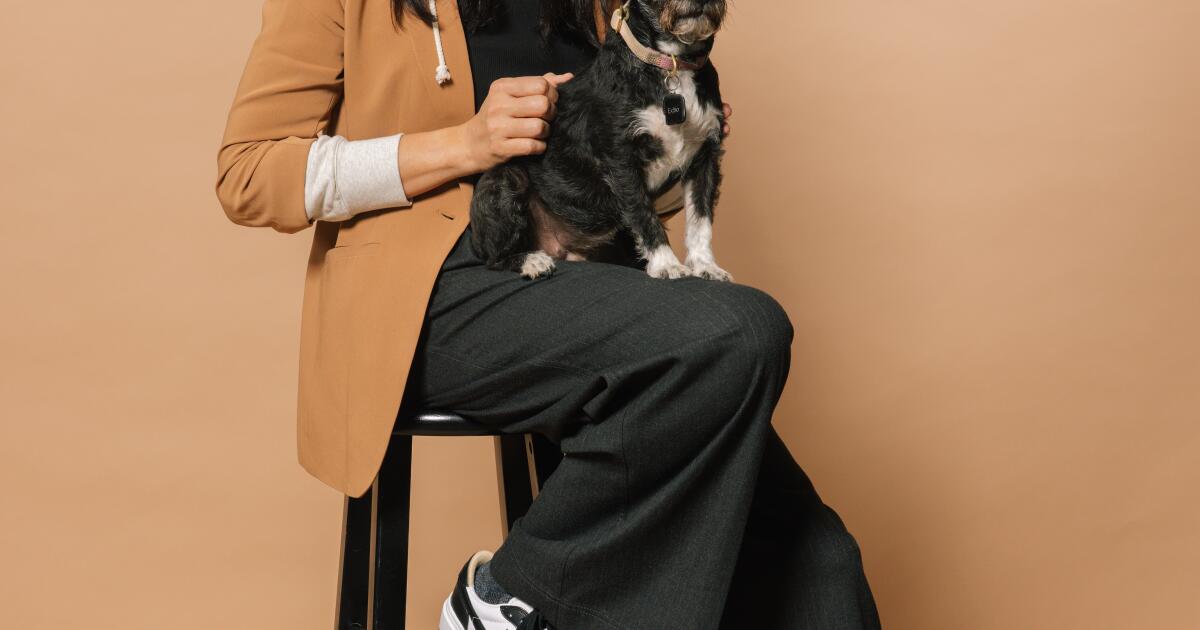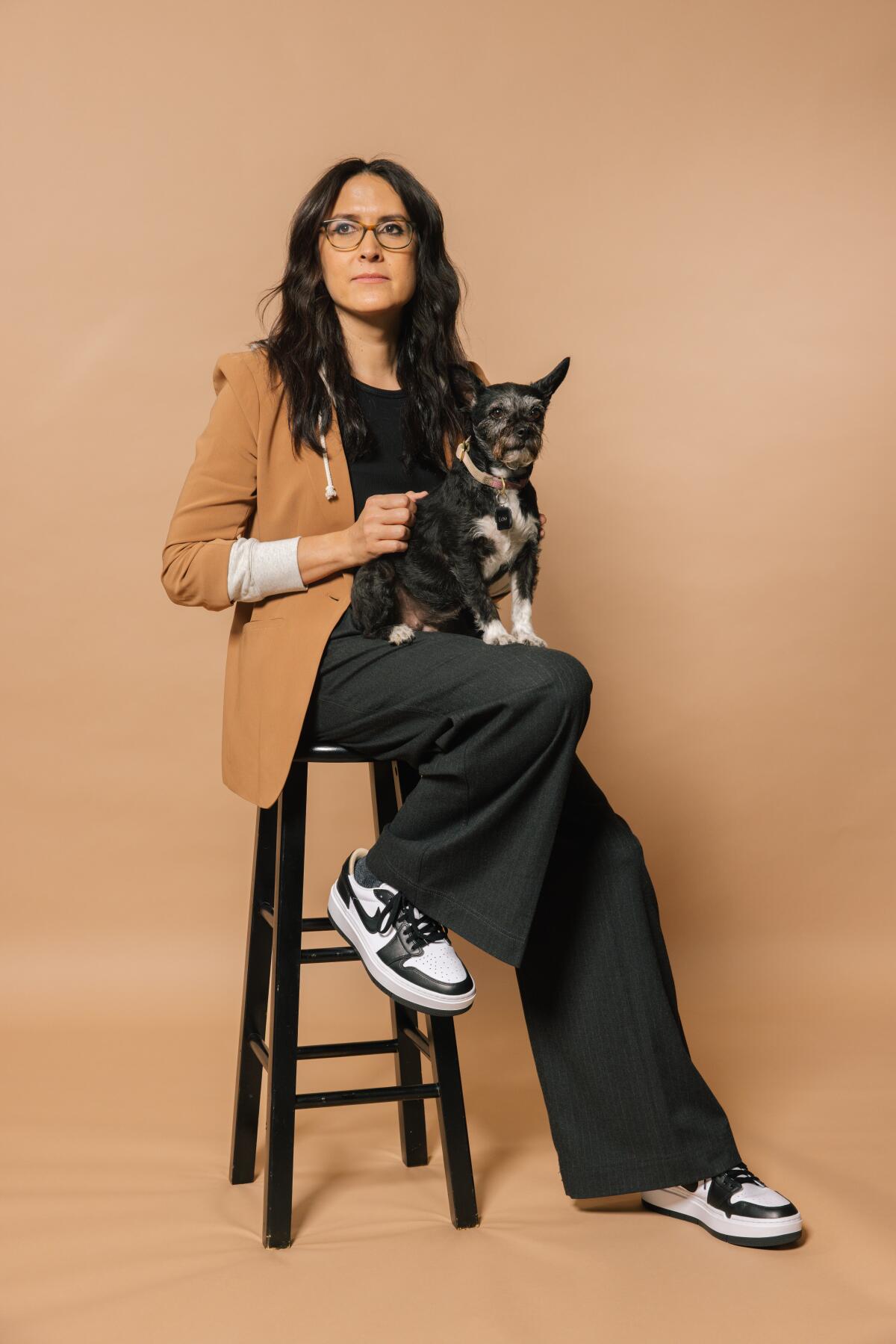
Filmmaker Sydney Freeland, executive producer of Marvel Studios’ upcoming “Echo,” with her dog Echo.
(Dania Maxwell / Los Angeles Times)
When Sydney Freeland was in high school, she would often get in trouble for doodling characters like Spider-Man and Venom in her notebooks.
The Navajo filmmaker grew up reading comics — “specifically Marvel comic books,” she says — and as a teenager would think about how those superhero stories would make great movies. (Hollywood would eventually agree, with multiple studios releasing multiple superhero comic book-based tentpoles a year nowadays.) Freeland’s love for comics and drawing even played a role in her decision to study fine arts in college.
But that teenager never imagined she would grow up to work on Marvel’s first television series that centers on a Native American protagonist. That’s partly because the concept of becoming a filmmaker wasn’t something that existed for Freeland back then.
“Echo,” which will launch on both Disney+ and Hulu in its entirety on Jan. 9, follows Maya Lopez, a young Choctaw woman who heads back to her hometown after a (violent) falling out with her former crime boss. The series was announced even before Maya, portrayed by Alaqua Cox, made her official debut in the 2021 series “Hawkeye” as the formidable leader of a local gang and one of the very few prominent Deaf characters within the Marvel Cinematic Universe.
“I learned about [‘Echo’] the same way everyone else did,” says Freeland, who serves as an executive producer and a director on the series. “I read [the announcement] thinking, ‘I would love to be a part of that but there’s no way in hell I’ll get that call.’”
Needless to say, she’s very grateful that she did.
For Brad Winderbaum, Marvel Studios’ head of streaming, television and animation, “it was a short leap” between introducing Maya in “Hawkeye” to wanting to hear Freeland’s take on the character.
Winderbaum had met Freeland years prior during Marvel’s search for a director to helm “Black Widow” (2021), a more grounded spy thriller with family themes. While the studio moved forward with Australian director Cate Shortland for that feature, Freeland had left an impression.
Freeland’s vision: Keep Maya and her story complicated and unapologetic and lean into the shades of gray.
Maya “is a more grounded, grittier, street-level character who had a traumatic past, who had a violent history, who had been taught violence by her mentors,” says Winderbaum. “It’s not an arc about a villain becoming a hero. It’s an arc about a woman wrestling with her past and finally being able to confront it. That was part of Sydney’s vision from the beginning.”
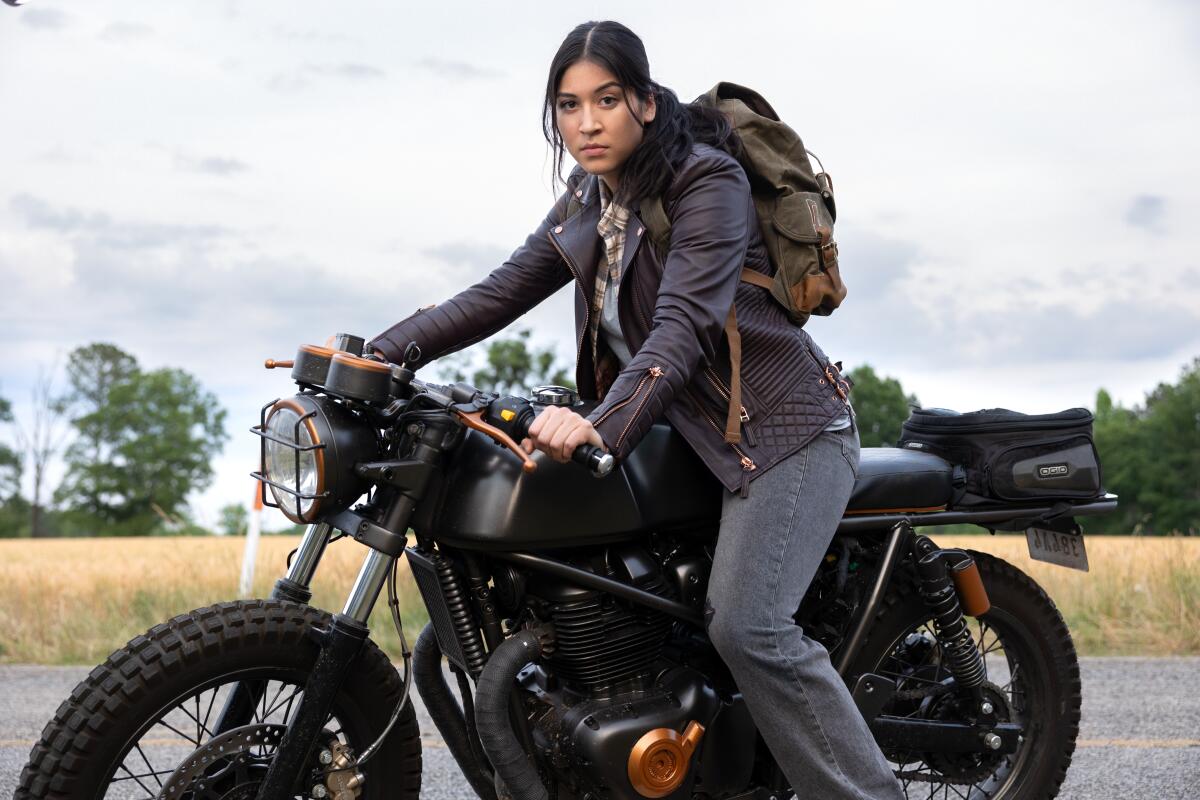
Alaqua Cox stars as Maya Lopez in “Echo.”
(Chuck Zlotnick / Marvel Studios)
During a December press day, Freeland notes more than once that it’s still “a little surreal to be talking about the project in the past tense.” But after being in postproduction for so long, she’s “definitely ready for people to see it.”
“The thing I’m most excited about is for people to see Alaqua Cox as Maya Lopez,” says Freeland, who has nothing but praise and admiration for her series lead. “There’s a ton of action in our series, but one of the things I’m most proud of is how emotional some of the scenes are.”
A five-episode series, “Echo” picks up shortly after the events of “Hawkeye” with Maya on the run after turning against the powerful crime lord Kingpin, also known as Wilson Fisk (Vincent D’Onofrio), her uncle, for killing her father. With New York in her motorcycle’s rearview mirror, she heads back to her hometown in Oklahoma, where she’ll reconnect with her family and community and come to understand her legacy.
Gritty and violent, “Echo” is Marvel Studios’ first series with a TV-MA rating. (Past TV-MA series such as “Daredevil” — which introduced D’Onofrio’s Fisk — were produced by Marvel Television, originally for Netflix.) It will also be the first to be released under the studio’s new Marvel Spotlight banner, which will signify projects with more self-contained, character-driven street-level stakes that do not require exhaustive knowledge of the broader MCU.
But beyond these Marvel milestones, “Echo” also marks the first time Freeland has been able to bring together two distinct, formative experiences that in her youth never crossed paths.
“I grew up reading comic books, and I grew up going to powwows, but those two things never overlapped or intersected with each other,” says Freeland, who was raised on the Navajo Nation reservation. “With this series, we smashed those two things together, [and] it was both terrifying and exciting.”
As part of the sprawling MCU, “Echo” is one of Freeland’s biggest projects to date. But despite its franchise bona fides, “Echo” also very clearly shares its DNA with Freeland’s earlier work, such as her debut feature-length film, the indie drama “Drunktown’s Finest” (2014), and the Netflix heist comedy “Deidra & Laney Rob a Train” (2017) — both movies premiered at Sundance. All three projects, in their own way, are meditations on family and legacy.
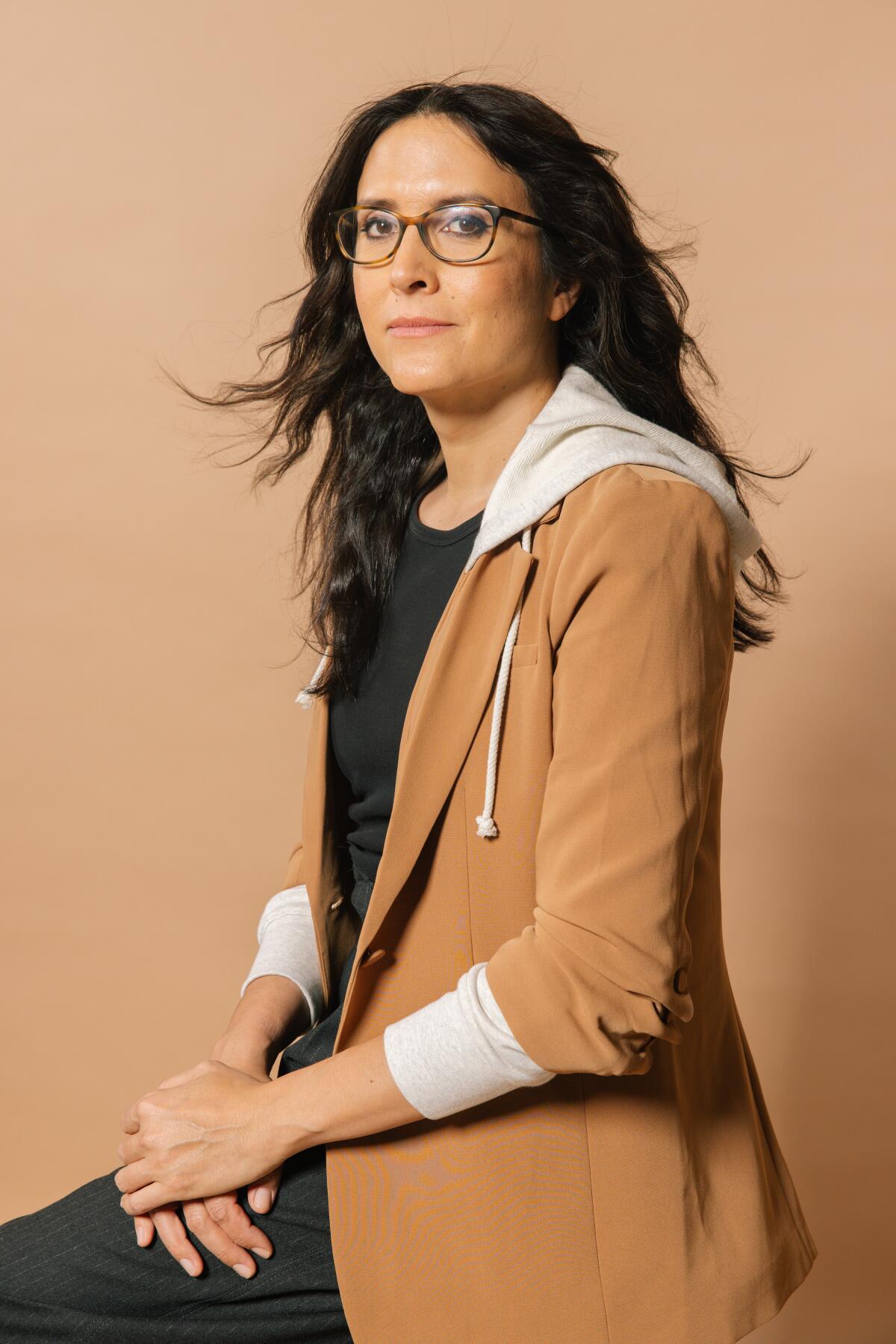
Filmmaker Sydney Freeland says she tends to gravitate toward “characters that are othered and operating on the fringes.”
(Dania Maxwell / Los Angeles Times)
As an Indigenous and transgender storyteller, Freeland says she is drawn to marginalized characters more than those of “average experiences.”
“I find myself particularly gravitating toward characters that are othered and operating on the fringes and different because that’s where I come from,” says Freeland. “I find myself relating to those characters more.”
One of the first things Freeland wanted to do when she came on board “Echo” was engage with the Choctaw Nation, the people who would be portrayed in the series. So she and her fellow “Echo” creatives traveled to Durant, Okla., to present the project to tribal representatives and ask for their permission — an approach Freeland says most Hollywood productions do not take when telling stories about Native Americans.
The goal was to start a dialogue with the community because she wanted to incorporate Choctaw language, culture and history through tribal members’ perspective to tell an authentic story.
“I think there’s this common misconception about Native Americans in the U.S. and Canada that we’re all kind of one big monolithic group of people and that is so far from the reality,” says Freeland. “I’m Navajo, I’m from New Mexico and the tribe we’re portraying are the Choctaw. Those two people’s languages, cultures and traditions are so different from each other.”
She knew that Maya’s status as a villain and the show’s violence and dark themes could make “Echo” a tough sell. But members of the Choctaw Nation understood that the series was aiming to tell a deeply human story, and Freeland says they have been “amazing partners and collaborators along the way.”
Another priority for Freeland was to start taking American Sign Language classes with members of the “Echo” crew. In addition to Deaf actors portraying Deaf characters, the series also had Deaf writers and consultants behind the scenes. Aside from helping with communication on set, what the production team learned in these lessons also helped inform some aspects of the filmmaking, including how to frame certain shots.
“I’m excited for people to see authenticity onscreen,” Cox says through an interpreter. “Because when I was growing up, I did not see that authenticity. I’m excited for children in the audience to be able to see themselves portrayed on the screen. I want them to feel like we can do anything and they don’t have to feel stuck.”
Portraying Maya in “Hawkeye” was the entirety of Cox’s Hollywood resume before she landed her own Marvel spinoff. And the actor says Freeland helped her the most in developing the character.
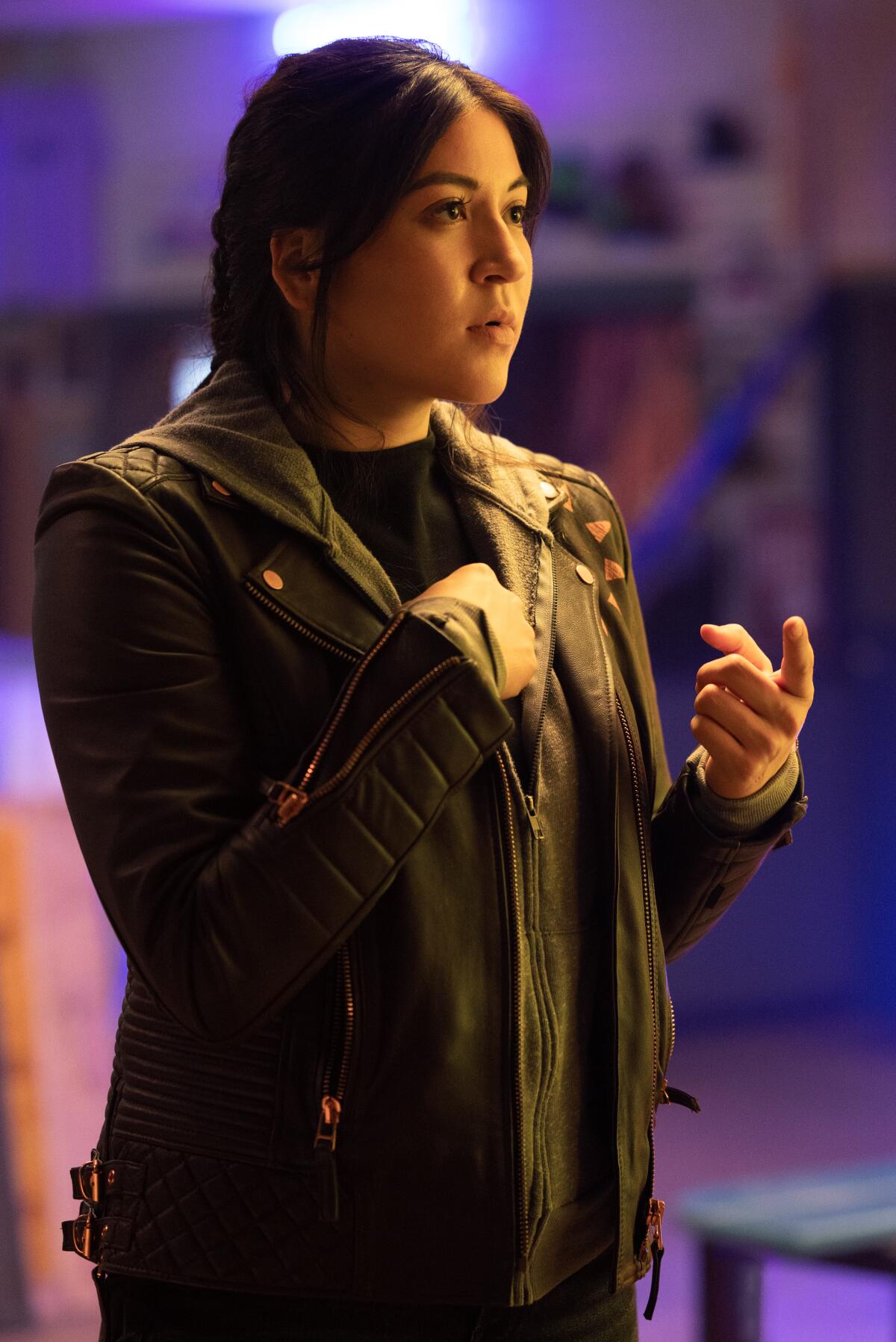
Alaqua Cox says conversations with Sydney Freeland helped her develop her “Echo” character.
(Chuck Zlotnick / Marvel Studios)
“Because I was still so new to this world of acting, I didn’t even know how to actually ask the right questions about how to relate to the character,” says Cox. “Syd always made sure I was OK and comfortable in my own boundaries, and she just wanted to make sure that the lines were appropriate and I liked them. I always liked that she made me feel very, very comfortable.”
Winderbaum describes Freeland as a fearless and fiercely collaborative filmmaker and one of the “least rigid” he has ever worked with.
“She was very honest with herself and with us as producers about what she thought worked, what didn’t work and where to drive our attention in a way that I thought was very rare and actually very brave as a filmmaker,” says Winderbaum. “Under Sydney’s leadership, there was a sense of community throughout the production where she was always open to ideas.”
As can be expected for these larger franchise projects, Freeland is mindful of spoilers and discussing certain details like whether or not Maya has any superpowers. But she does tease that “by the end of the series, the name ‘Echo’ will make sense.”
One of the scenes in the series that Freeland was most invested in involves an action set piece around a sporting event. Set during a time before the Columbian exchange in the Americas, it features Indigenous characters from all corners of the continent. Freeland says it was both exciting and rewarding to be able to build out and portray what that world could have looked like. Standing on that set, Freeland took a rare moment to take it all in.
“You don’t often have a lot of time to sit and think and process on a film set,” she said. “But that was one moment where I felt incredibly happy and overjoyed.”
There is also a big episode that revolves around a powwow, which required the “Echo” team to re-create one from scratch in Georgia, with vendors, dancers and all, where they shot for multiple nights.
“It was incredibly important [for me] that we portray that in a way that was familiar to my experience growing up,” says Freeland. “By the second night, it started to feel very lived in to the point where, in my mind, I was actually at a powwow … and I had to snap out of it [to remind myself that] we have to get our shots and make our days.”
Freeland, who has also been an episodic director on a number of TV series such as “Star Trek: Strange New Worlds,” “Rutherford Falls,” “P-Valley” and “Fear the Walking Dead,” says she approaches each directing job as an opportunity for her to grow as a filmmaker. She also points to her time as a staff writer and director on the first season of “Reservation Dogs” as one that helped her approach to “Echo.” After mulling over the idea of what a Native American TV show should look like or be about, she said the show’s co-creator, Sterlin Harjo, suggested that the writers just make something they would have wanted to see as kids.
“I tried to take the same approach and thought about what would resonate for me as a kid watching a Marvel TV show around an Indigenous character,” says Freeland.


